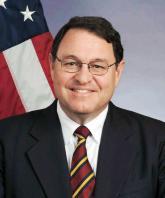The Department of Commerce announced on March 14 that it will give up its last bit of control of the Internet Corporation for Assigned Names and Numbers (ICANN) in 2015. As is often the case with government decisions announced late on a Friday, this decision is controversial. The U.S. has exercised light oversight of ICANN since it established the organization and emphasized the need for a free and open Internet.
Other nations do not share America’s perspective and have sought repeatedly to work through U.N. organizations such as the International Telecommunication Union (ITU) to constrain and censor the Internet. America’s oversight of ICANN has provided a bulwark against these efforts. As the United States steps back from its formal role in Internet governance, these countries can be expected to intensify their efforts. If the Administration does not step up, Congress should require that key principles be followed in this transition to ensure the exercise of freedom on the Internet.
ICANN’s Role in Internet Governance
ICANN is a U.S. nonprofit corporation established in 1998 to manage the Internet’s domain name system (DNS). The DNS is what allows users of the Internet, for example, to type “Heritage.org” and reach the correct website. ICANN is also responsible for the system of global top-level domains (gTLDs) such as .org, .com, and .gov. The responsibility for assigning names and numbers to websites is known as Internet Assigned Number Authority (IANA). Since ICANN was created in 1998, it has been contracted by the U.S. Department of Commerce’s National Telecommunications and Information Administration (NTIA) to administer the IANA. While ICANN has been responsible for a large part of the technical details of running the DNS system, it works cooperatively with an American corporation, Verisign, which actually makes technical changes in the “root zone,” which is essentially the core of the Internet.[1]
The March 14 announcement stated that when the current contract with the NTIA expires in 2015, the U.S. government will not renew it and, therefore, will no longer oversee ICANN’s administration of the IANA and DNS functions. With the U.S. government ceasing its stewardship, the next step, as stated by NTIA, is for ICANN to “convene global stakeholders to develop a proposal to transition the current role played by NTIA.”
Trouble Ahead
Details of the structure of this successor institution are scarce. NTIA has stated that it would have to “Support and enhance the multistakeholder model; Maintain the security, stability, and resiliency of the Internet DNS; Meet the needs and expectation of the global customers and partners of the IANA services; and, Maintain the openness of the Internet.”[2] The NTIA also clarified that it would “not accept a proposal that replaces the NTIA role with a government-led or an inter-governmental organization solution.”
Beyond these broad outlines, little is known about how this process will work, how the successor will be organized or populated, the extent or nature of its authority, or how it would be insulated from interference from individual governments or organizations such as the ITU. This is a concern because the U.S. oversight of ICANN has been focused on enhancing the stability and reliability of the Internet while preserving the openness and innovative nature critical to its growth.
Although the U.S. regulatory hand was light, its role was seen as a vital bulwark to preserve the independence of ICANN and ensure that American priorities for a free and open Internet were defended. With the U.S. government’s role receding, ICANN’s executive committee will have greater autonomy and could act in ways contrary to U.S. interests and the interest of a free Internet. While the NTIA announcement specifically stated that it opposes granting oversight to a government-led or an inter-governmental organization, once the U.S. ends its oversight, America’s ability to enforce this outcome is diminished.
Indeed, announcing its intent to end U.S. oversight before finalizing the details of the successor body may allow other nations to intrude on the process in a counterproductive manner. Certainly, the ITU will be emboldened and escalate its efforts to claim a role in Internet governance. While a vaguely defined “Internet community” could be a fickle or inefficient overseer of ICANN, the ITU would be subject to pressures from nations such as China, Iran, and Russia that would seek to advance “cyber sovereignty” measures to stifle internal dissent. Previous attempts have been rebuffed largely due to America’s unique role and ICANN’s consistent resistance to cyber sovereignty and ITU control efforts. But absent direct U.S. support, ICANN must answer to 193 nations, many of which want to control and obstruct a free and open Internet.[3 ]
American Leadership Vital to Sustaining Internet Freedom
Given these concerns, the U.S. and its allies should fend off assaults on the openness of the Internet by:
- Establishing an Internet freedom strategy. With America’s role shifting from formal oversight and stewardship to one of influence and persuasion, the U.S. should develop a clear strategy that encompasses its goals, how it will achieve them, and who its allies and opponents are in this effort. The goal should be an open Internet that is free from government and U.N. interference. Importantly, this goal should be matched by actions that will lead to that goal. The U.S. should build a coalition of like-minded nations, businesses, and nongovernmental organizations (NGOs) to defend freedom on the Internet from authoritarian nations and the ITU.
- Creating clear guidelines for what ICANN’s new oversight should look like. ICANN should be insulated from political pressure from the U.N. and authoritarian governments but should also be accountable to individuals and businesses that rely on its actions. Congress should mandate a set of guidelines for international oversight of ICANN, including requiring that:
- ICANN’s new oversight system is not based on inter-governmental or U.N. control of ICANN;
- ICANN develop a multi-stakeholder oversight system incorporating large, medium, and small businesses and industry groups with the authority to veto ICANN decisions that threaten the openness or viability of the Internet;
- ICANN submit to an independent auditing body comprised of government, business, and NGO representatives to monitor its finances and activities; and
- ICANN demonstrate to the U.S.’s satisfaction its technical capability to manage the root zone and shield it from malicious interference.
- Emphasizing that it will maintain its governance role over ICANN if the successor proposal endangers the openness and freedom of the Internet. Congress should specifically instruct NTIA, at penalty of losing its funding, to renew the ICANN contract should these requirements not be met. This decision would likely be protested by authoritarian nations that think they will gain from an independent or ITU-overseen ICANN, but such criticism is preferable to subjecting the Internet to their governance.
Out of the Frying Pan, into the Fire
The U.S. has a strong interest in maintaining an open and free Internet. If Internet functions were harmed, not only would there be economic damage, but a vital forum for freedom of speech and political dissent would be compromised. While the transition of Internet stewardship from the U.S. may have been inevitable, it is unclear why the U.S. surrendered its greatest point of leverage prematurely. Surrendering U.S. oversight of ICANN was a key objective of many nations that wish to curtail freedom on the Internet.
Even though the Department of Commerce now says its oversight will continue until a satisfactory new system is in place, important leverage has been lost, making it more difficult to craft a satisfactory solution. The decision may appease nations that are unhappy with U.S. policy generally, which has been exacerbated by the revelations of Edward Snowden, but that goodwill is a rapidly depreciating currency and is unlikely to overcome efforts by nations determined to censor, constrain, or use the Internet to stifle dissent.
—Brett D. Schaefer is Jay Kingham Fellow in International Regulatory Affairs in the Margaret Thatcher Center for Freedom, a division of the Kathryn and Shelby Cullom Davis Institute for International Studies; James L. Gattuso is Senior Research Fellow for Regulatory Policy in the Thomas A. Roe Institute for Economic Policy Studies; Paul Rosenzweig is a Visiting Fellow in the Edwin Meese III Center for Legal and Judicial Studies and the Douglas and Sarah Allison Center for Foreign and National Security Policy, a division of the Davis Institute; and David Inserra is a Research Assistant for National Security and Cyber Security in the Allison Center at The Heritage Foundation.
Adapted from heritage.org




